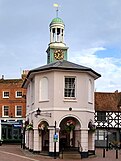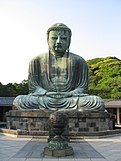From today's featured article
Did you know ...
- ... that the old town hall in Godalming, Surrey, is nicknamed "The Pepperpot" (pictured) after its distinctive cupola?
- ... that KFC rice may have originated as a quick, cheap Christmas dinner, owing to the popularity of KFC in Japan?
- ... that Mary Burt Messer was researching and writing about the sociology of divorce as early as 1924?
- ... that following the release of Olivia Rodrigo's song "The Grudge", fans speculated that it was about her supposed feud with Taylor Swift?
- ... that the Reichsgesetzblatt was last issued five days before the Battle of Berlin began?
- ... that employees resigned from an Illinois TV station after ownership decided there were too many people on the payroll?
- ... that the heavy metal band Cradle of Filth released a T-shirt that was so offensive that several people were arrested for wearing it?
- ... that bugs reported during the development of The Sims 2: University included "zombies can't fall in love" and "zombies walk on water"?
In the news
- A ceasefire is announced following Azerbaijan's launch of a military operation in Nagorno-Karabakh.
- Evika Siliņa (pictured) takes office as Prime Minister of Latvia.
- In Hanoi, Vietnam, a fire at an apartment building kills at least 56 people.
- The FIBA Basketball World Cup concludes with Germany defeating Serbia in the final.
On this day
- 1498 – A tsunami caused by the Meiō earthquake washed away the building housing the statue of the Great Buddha (pictured) at Kōtoku-in in Kamakura, Japan; the statue has since stood in the open air.
- 1792 – The French Army achieved its first major victory of the War of the First Coalition at the Battle of Valmy.
- 1967 – L. Ron Hubbard, the founder of Scientology, announced the story of Xenu in a taped lecture sent to all Scientologists.
- 1997 – Hurricane Erika, the strongest and longest-lasting hurricane of the 1997 Atlantic hurricane season, dissipated after causing flooding and power outages throughout Puerto Rico.
- Susanna Rubinstein (b. 1847)
- Edith Rogers (b. 1894)
- Davidson Nicol (d. 1994)
- Victor Henry Anderson (d. 2001)
Today's featured picture
|
The 1990 Nepalese revolution was a multi-party movement that brought an end to absolute monarchy and the beginning of constitutional monarchy, eliminating the panchayat system in Nepal. The revolution began in February 1990 following an alliance between two opposition groups: the Nepali Congress and the United Left Front. In the subsequent weeks, the movement became increasingly large and dangerous as thousands of students marched against riot police and hundreds were arrested and injured. The movement called for bandhs (a kind of general strike) that quickly spread across the country. In early April, 200,000 people marched to Kathmandu in protest of the monarchy. Over the course of several days, police shot and killed dozens as protesters demanded a restoration of the 1950s-era multiparty democracy system. Protesters surrounded government buildings, and King Birendra eventually removed the ban on political parties on 8 April, ending the revolution. This photograph, taken on 9 April, shows Durga Thapa, a Nepali student, leaping in the air while displaying a double victory sign amidst a large crowd in Asan, Kathmandu. Photograph credit: Min Ratna Bajracharya
Recently featured:
|
Other areas of Wikipedia
- Community portal – The central hub for editors, with resources, links, tasks, and announcements.
- Village pump – Forum for discussions about Wikipedia itself, including policies and technical issues.
- Site news – Sources of news about Wikipedia and the broader Wikimedia movement.
- Teahouse – Ask basic questions about using or editing Wikipedia.
- Help desk – Ask questions about using or editing Wikipedia.
- Reference desk – Ask research questions about encyclopedic topics.
- Content portals – A unique way to navigate the encyclopedia.
Wikipedia's sister projects
Wikipedia is written by volunteer editors and hosted by the Wikimedia Foundation, a non-profit organization that also hosts a range of other volunteer projects:
-
Commons
Free media repository -
MediaWiki
Wiki software development -
Meta-Wiki
Wikimedia project coordination -
Wikibooks
Free textbooks and manuals -
Wikidata
Free knowledge base -
Wikinews
Free-content news -
Wikiquote
Collection of quotations -
Wikisource
Free-content library -
Wikispecies
Directory of species -
Wikiversity
Free learning tools -
Wikivoyage
Free travel guide -
Wiktionary
Dictionary and thesaurus
Wikipedia languages
This Wikipedia is written in English. Many other Wikipedias are available; some of the largest are listed below.
-
1,000,000+ articles
-
250,000+ articles
-
50,000+ articles


